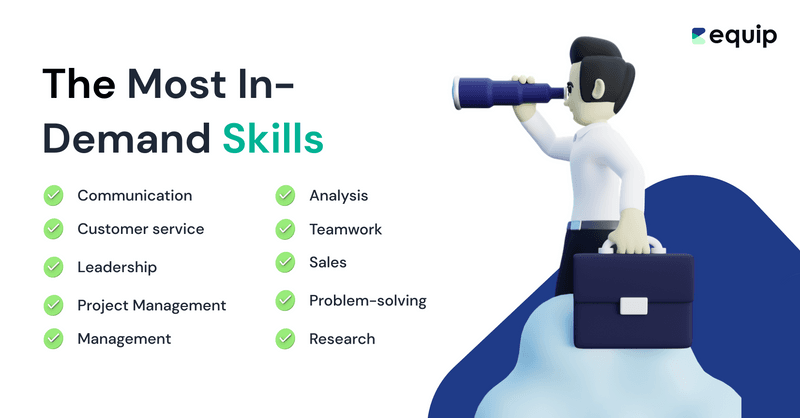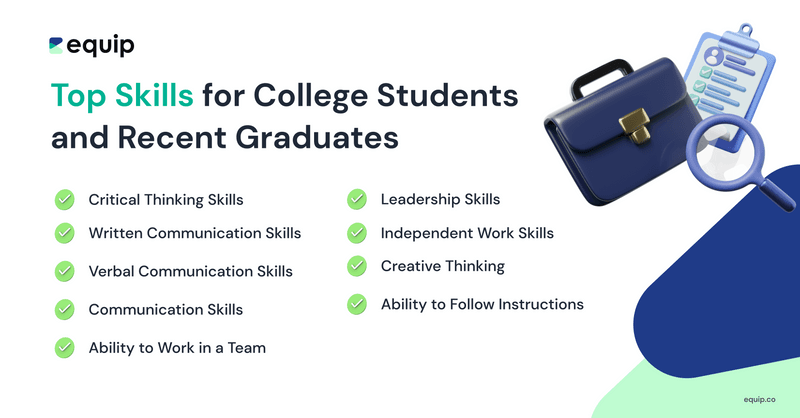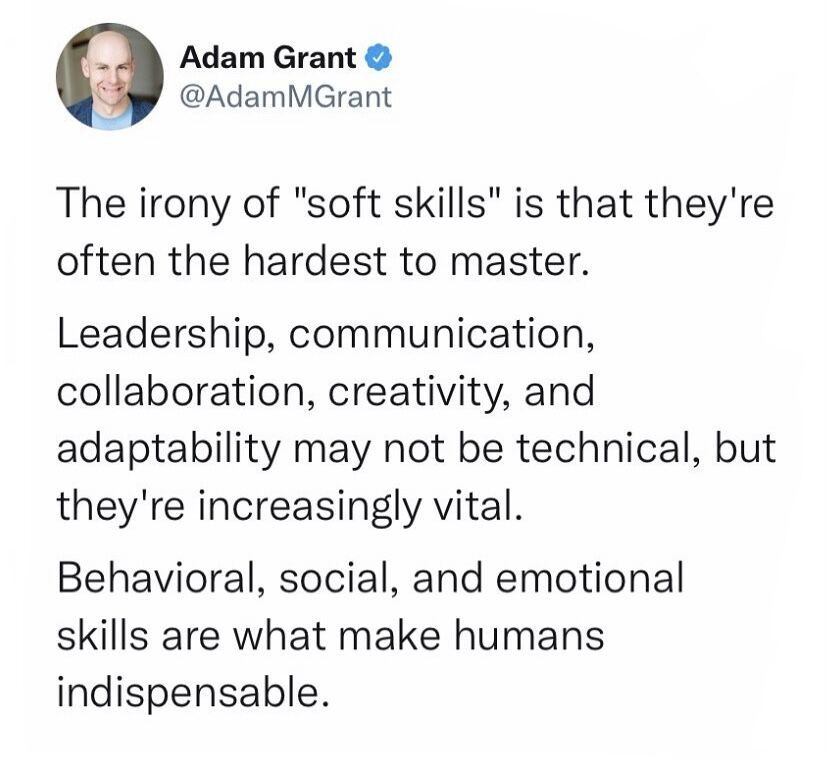What are skills? Are they a bunch of words added crisply into a resume in a bulleted format?

Skills are not words one can throw on a piece of paper.
Social psychologist Albert Bandura defines skill as learned capabilities that enable people to perform activities successfully, and he emphasized the importance of self-efficacy in skill development.
According to Bandura, self-efficacy is the belief in one's ability to execute a particular behaviour or skill successfully, and it plays a critical role in motivation, goal-setting, and persistence. Bandura also noted that skills are often situation-specific and may need to be adapted to different contexts and challenges.
In the last couple of years, the importance of skills has overpowered the importance of having a degree. According to a study by The Burning Glass Institute, the percentage of jobs requiring a college degree fell from 51% in 2017 to 44% in 2021.
Most startups do not ask for a degree as proof while advertising for jobs, hence, it can be safe to assume that although degrees are important, what constitutes a strong candidature from a weak one is the demonstration of a wide variety of skills—both hard skills and soft skills.
What are the skills employers seek from an ideal candidate?
There are multiple skills that candidates need to acquire and build in 2023. In fact, with conversations about AI doing the rounds every day, it is believed that most entry-level roles will become redundant or replaced by AI in the next couple of years.
Additionally, with the advent and advancement of AI, candidates or graduates now need to be versed in technology that’s built on AI. Of course, every job type requires a particularly crafted skillset, but there are some skills that remain consistent across professions and job functions. Skills can be broadly classified into two categories: soft skills and hard skills.
According to this article by LinkedIn, the most in-demand skills are:

Let’s decode the two broad categories namely soft skills and hard skills and further demystify the various skills that recruiters must look out for in students or graduates.
Read further: Campus Hiring 101: A Complete Guide to Campus Recruitment Process for Recruiters
Soft skills versus hard skills
Soft skills and hard skills don’t need to compete with each other. In fact, both are needed to succeed and thrive in the corporate world.
Soft skills are essential to not only gauge a candidate’s interpersonal skills but also to understand how they would perform within teams, handle complex problems, and lead with empathy when required.
Examples of soft skills include communication, problem-solving, critical thinking, adaptability, leadership, time management, collaboration, and teamwork.
Hard skills on the other hand are technical in nature that are specific to a particular job or industry, such as programming, data analysis, accounting, and engineering, or creative such as writing, marketing, and more.
These skills are typically learned through formal education, training programs, or on-the-job experience. Hard skills are important because they enable individuals to perform specific tasks and job functions with a high degree of proficiency and accuracy.
Top Skills for College Students and Recent Graduates

Today’s job market has compelled employers to look beyond the hard and technical skills and assess a candidate’s overall skill set including soft skills.
Soft skills such as communication—written, and verbal, problem-solving, a combination of critical and creative thinking, and solving problems with an analytical bent of mind—all tend to be a prerequisite in almost every job role. Employers value candidates who demonstrate such skills not only in interviews but also at work.
Developing soft skills can also help college students in their personal lives, as these skills can help them build stronger relationships, communicate more effectively, and navigate complex situations.
Furthermore, college is an ideal time to develop soft skills, as it provides students with a supportive environment where they can experiment, learn, and grow.
By participating in extracurricular activities, joining clubs, volunteering, and taking on leadership roles, college students can develop a range of soft skills that will benefit them in their future endeavours.

1. Critical Thinking Skills
Since the internet and technology have overtaken most of our lives, it might feel like everyone’s living in an echo chamber. This is why it’s vital to encourage looking at the world from different perspectives.
Critical thinking skills are the ability to analyze information objectively, identify patterns, and evaluate arguments to make reasoned decisions. This involves being able to question assumptions, consider alternative perspectives, and weigh the evidence in a logical and systematic manner.
For instance, a recruiter can assess a candidate’s critical thinking skills by merely posing a question borrowed from an event they experienced/witnessed at work.
Here’s a sample question:
“Assuming you begin working with us and are tasked with developing an advertising campaign that requires you to convert at least 30 paid users for our product/service. You need to convince the stakeholders, prepare a pitch, collaborate with team members, and successfully launch the campaign in under 2 weeks. How will you successfully complete this project?”
Looking for more question prompts? Here is a list of 38 Preliminary Screening Questions
This would allow the recruiter to assess the candidate on multiple skills but more importantly, analyze the difference between how the situation took place in real life, and whether the candidate was able to give a suitable response to the situation.
2. Written Communication Skills
They refer to the ability to convey ideas, thoughts, and information effectively through written text. It involves the ability to organize and structure information in a clear, concise, and grammatically correct manner.
Strong written communication skills are essential in professional settings, as they help to ensure that messages are delivered clearly and accurately.
This can be easily assessed by recruiters using Equip's Short Answer Text Question Type which is ideal for essay-type questions.
Recruiters can test candidates on written communication in multiple ways. They can use the following question:
Craft an email to our client informing them that the deliverable you planned to share by the end of the day will be delayed and will now be sent within the next 24 hours.
When testing candidates, you can set up these questions on Equip that will allow you to share the assessments with multiple candidates in one go. It also offers the flexibility to set a deadline, and the assessments are proctored.
3. Verbal Communication Skills
Refers to the ability to express oneself clearly and effectively using spoken words. It involves being able to articulate one's thoughts and ideas, listen actively to others, and respond appropriately to the situation at hand.
An example of verbal communication skills in a professional setting would be a sales representative who is tasked with pitching a product to a potential client.
The sales representative must possess strong verbal communication skills to communicate the product's features and benefits to the client.
Verbal communication can be tested in multiple ways and recruiters can leverage technology such as Equip by setting up the following questions (templates you can borrow):
Assuming you’re a sales rep at your dream tech company (example: software that helps busy founders conduct hiring seamlessly within one platform thereby reducing time and costs), and you’re at an event with multiple founders. You need to subtly pitch the product without sounding too salesy. Paint a narrative, be creative—but verbally.
Talk about a time when you were in a situation at work or during college where you had to convince a professor or client to shift the deadline to a later date.
Talk about your worst experience in college/internship with a fellow student or colleague and how you navigated it.
This will allow you to assess a candidate’s clarity of thought, ability to navigate complex situations and explain them briefly, pronunciation, and grammatical errors.
Take a look at some of the important Question Types on Equip for communication skills in the sample test below:
4. Communication Skills
Communication skills are important for every job. Communication skills are both verbal and non-verbal. The latter includes tone, body language, and the ability to empathize with the person being spoken to.
Poor communication skills can have negative repercussions for the organization. They can make or break client interactions and hence, it constitutes an extremely vital skill set for a professional to possess.
Out of all the skills communication skills can be easily assessed depending upon the type of communication being tested—verbal or written.
To assess communication, recruiters can instruct candidates to write on a variety of topics in various formats such as social media, emails, a pitch, and more.
For verbal communication, recruiters can request candidates to speak on topics that are borrowed from their real-life experiences or expect them to verbalize a hypothetical scenario.
Recruiters can assess communication skills by conducting group discussions and one on one interview sessions.
A modern solution to assessing communication skills can be done through a platform like Equip, which enables recruiters to conduct async video interviews.
5. Ability to Work in a Team
The ability to work in a team refers to an individual's capacity to collaborate and communicate with others towards achieving a common goal. It involves being able to contribute to the team's success, accept feedback, and work towards a shared outcome.
Teamwork is not an option but a requirement and is almost always included in every job role. It’s defined as an individual’s ability to collaborate and communicate when working with a group of people in a professional setting to achieve a common goal.
An example of the ability to work in a team can be seen in a group project at school, where each member has a specific role to play in completing the project. For instance, if the project is to create a presentation, one team member may be responsible for designing the slides, another for conducting research, and another for presenting the information.
The following can be great ways through which recruiters can assess leadership skills:
Ask for examples of collaboration: Ask candidates to provide examples of times when they collaborated with team members to achieve a goal. This can help assess the candidate's ability to work well with others and contribute to a team's success.
Assess their problem-solving skills: Ask candidates to describe a situation where they had to work with a team to solve a complex problem. This can help assess the candidate's ability to collaborate with others, share ideas, and find solutions to problems.
Ask about their strengths and weaknesses: Ask candidates to describe their strengths and weaknesses in working in a team environment.
6. Leadership Skills
Leadership is a loosely thrown-around word and refers to the head of a department dominating the remaining employees. Traditionally, that may have been true and the same would occur in most workplaces, however, the definition of leadership has changed over the years.
Leadership is a set of qualities that enable a group of people or even an individual to move towards a singular goal, particularly an organization’s goal. This skill also comprises empathy, communicating assertively, quick and accurate decision-making, and the ability to empower others.
Leadership positions exist in almost every organization, however, they’ve usually been associated with people who’ve spent a huge chunk of their work life carrying out various roles.
Since the last couple of years, the definition and narrative around leadership have shifted dramatically. This has occurred as a result of the dramatic rise in the younger generation starting businesses, and demonstrating the above-mentioned skills, instead of charting the same path as the previous generation.
An example of leadership skills in action would be a project manager who is responsible for leading a team of developers to create a new software product. The project manager must possess strong communication skills to delegate the project goals, timeline, and expectations to the team members.
In addition, the project manager must possess critical thinking skills to identify potential risks and opportunities for improvement, and empathy to understand and address the needs and concerns of their team members.
Lastly, the project manager must be able to motivate and empower their team members to work towards the common goal of delivering a successful software product.
By utilizing their leadership skills, the project manager can create a positive and productive work environment that fosters collaboration, creativity, and innovation, ultimately leading to the successful completion of the project.
Like other soft skills, it’s not easy for recruiters to assess leadership skills. Leadership, out of all, is the most difficult to assess but not impossible.
The only way for a recruiter to assess a candidate’s leadership skills is by asking them the following questions during the interview stage:
Conflict resolution: Ask candidates to describe a situation where there was a conflict within a team they led and how they resolved the conflict. This can help assess the candidate's ability to handle conflict and maintain team morale.
Assess their problem-solving skills: Ask candidates to describe a situation where they had to solve a complex problem and how they involved their team in the problem-solving process. This can help assess the candidate's ability to lead a team through challenging situations.
Ask for examples of mentorship: Ask candidates to provide examples of times when they mentored or coached a team member to improve their skills or performance. This can help assess the candidate's ability to develop and nurture talent within a team.
7. Independent Work Skills
The ability to work independently is defined as an individual’s ability to work with minimal to no supervision, proactively seek opportunities at work, take initiative, look for basic solutions to problems themselves, and independently manage their time while meeting deadlines.
Let’s assume that an employee is given a project to complete with a 2-week deadline. This is how they can demonstrate their independent work skills:
Breaking it down into small chunks and manageable tasks. This requires understanding the project’s scope and thereby looking at it both from a bird’s eye lens and a detailed view.
Setting an outcome and giving it proper timelines. Employees should set realistic goals and spread out timelines for individual tasks or for a project to complete on time.
The ability to prioritize tasks. Taking up crucial tasks first is a must.
Delivering the project on time. A candidate’s ability to deliver the project on time while maintaining its quality is an underrated way to address their ability to work independently and manage their time well.
While this isn’t always easy to assess until the employees are officially onboarded to the company and begin working, but, during the interview or assessment process, recruiters can ask or state the following:
Tell me about a time when you had to motivate yourself to do a task on a strict deadline.
How did you communicate about a grave error you made to a senior in college or at work and how did you overcome it?
8. Creative Thinking
This is defined as the ability to look at problems in an innovative, original, imaginative way but more importantly from a lens that’s never been thought of. Creative thinking requires one to explore avenues that help create ideas by breaking away from established norms and by questioning the status quo.
For recruiters to assess the skill of creative thinking, they would need to evaluate the role they’re hiring for.
The following questions can act as a great start to assessing creative thinking regardless of the creative role:
While building a marketing campaign, what are the most essential factors you would need to do before you start building the campaign?
Borrowing from any of the previous projects you worked on, explain your process of building it from the beginning till the end.
If you were asked to brainstorm ideas for a new product, what process would you use to generate creative ideas? How would you evaluate the ideas and choose the best one?
9. Ability to Follow Instructions
This skill refers to an individual's capability to comprehend, process, and execute directions given by a superior or authority figure. It requires attention to detail, active listening, and a strong willingness to comply with established procedures or guidelines.
Here’s an example of how this skill can be demonstrated in different contexts:
A manager may provide specific instructions to an employee on how to complete a task, such as completing a project. An employee with strong instruction-following skills will be able to understand and execute the manager's instructions correctly and within the required timeframe.
There are multiple ways through which recruiters can assess the skill better:
Provide instructions and observe how the candidate responds: Recruiters can provide a simple set of instructions, such as how to find a specific location or how to complete a task and observe how the candidate responds. They can assess whether the candidate follows the instructions accurately and completely.
Provide a task to complete: Recruiters can provide the candidate with a task to complete, such as solving a case study.
Use hypothetical scenarios: Recruiters can provide hypothetical scenarios, such as what the candidate would do in a specific situation, and ask them to describe the steps they would take to follow instructions accurately.
This skill is generally followed in every industry that has set standard operating procedures (SOPs) or follows rules from a rule book or from a manual. Industries like the armed or naval forces, aviation, hospitals, and factories of all kinds value this particular skill more than a few others.
Conclusion
A study by LinkedIn titled Global Talent Trends Report (2019) found that 92% of talent professionals and hiring managers agreed that soft skills are equally or more important than hard skills when hiring. However, the same study also reveals that 89% of hiring managers struggle to find candidates with the right soft skills.
Recruiters are people-success managers, and while a majority of their job must be spent on optimizing for the candidate’s success, that usually isn’t the case. They often get stuck in cycles of mundane, and manual work that can be partially offloaded to software.
Want to leverage technology to assess quality candidates faster? Try Equip.
